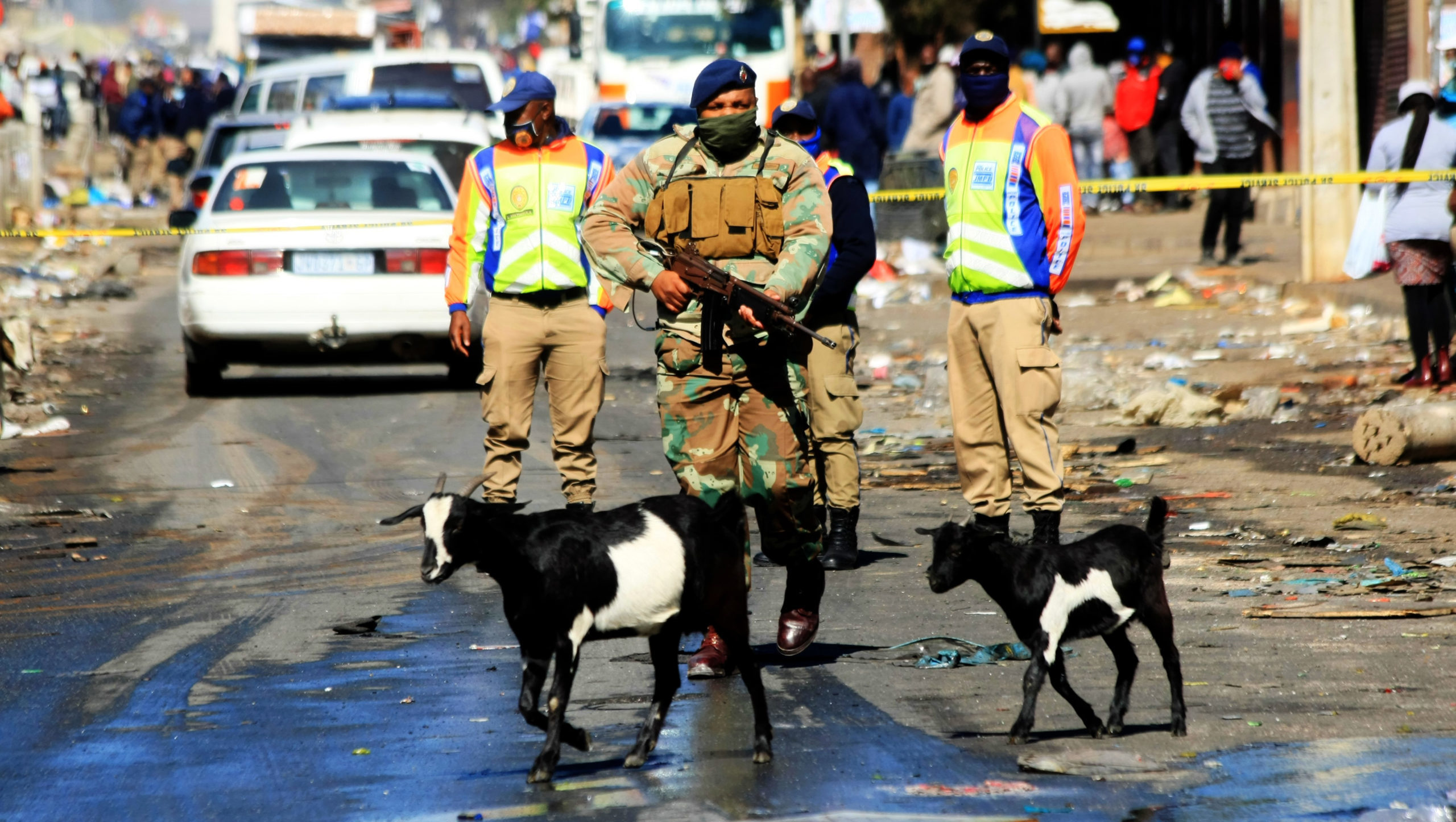
Banner

Days of wreckage and reckoning
As South Africans face the largest outbreak of unrest and violence in the post-apartheid era, the community of KwaZulu-Natal reels from safety concerns, lost businesses, and looming food and fuel shortages.
In Gauteng, while central community areas haven’t been directly affected, the province remains on tenterhooks as it looks at the longer-term effects on the country as a whole.
“It’s like a war zone. I haven’t slept for two days,” said Michael Ditz, shortly before he began another patrol in his Durban North neighbourhood this week.
Ditz, the co-owner of retail chain Jam Clothing, said that last week, they owned 115 stores with a national footprint. This week, “we are now down to 99, we have lost 16 stores. Some have been burnt to the ground, others just had their goods looted.”
“We still have to assess the full damage, but the tragic irony is the long-term job losses – it will take years to rebuild.”
Ditz said it was too early to process fully the shock of the past few days. “I just feel gutted,” he said.
He said they also faced personal danger. “Our families and our houses are under threat. We are literally guarding our own neighbourhood.”
Yet, he said, unity had been forged in this regard. “We have been working with the Muslim community.” A similar collective effort is also happening in Jewish community member Darren Katzer’s neighbourhood in central Musgrave.
“With the Muslim community, it has been unbelievable. We are working closely together, just protecting each other and doing whatever we can.”
Especially as food shortages become a real possibility, “our neighbourhood block is literally having meals with all of us together, so that we can pool our food, because we don’t know if we are going to run out. That’s the reality.”
The looting has decimated businesses, shops, and factories in the area, and the violence is “on their doorstep”. The equivalent of their proximity to the unrest would be something like the looting of Norwood or Sandton in Johannesburg.
Shops are now shut in the vicinity, and where one might be found open, mass queues are forming. Janyce Bear, who along with her husband, Rod, are shop owners in a mall that was looted in Glenwood, said people were trying to source items like baby formula.
She said her family had looters strolling in their neighbourhood, “coming up our road with their trolleys filled with stolen goods. You feel like you are in another world.”
Both she and her husband were recovering at home from COVID-19 when their mall was attacked, and while they are grateful their store was spared, they are devasted for the other tenants.
It’s a sentiment that Jenny Kahn, who owns a store with her husband in the same mall, shares. She described their fellow tenants as “family”, who have even helped with donations to the Union of Jewish Women outreach activities in which she is involved.
“By the grace of G-d and my prayers to Hashem, for some unknown reason, our shop was spared,” she said. The sole reason they can think of for the sparing of their shop is that while they are a jewellery store, they also sell “fancy goods”. These include menorahs, which were on prominent display in their window.
“The majority of the people that buy the menorahs are Christian church goers.” Perhaps, she muses, this acted as some kind of deterrent.
Hayley Lieberthal, the media spokesperson for the South African Jewish Board of Deputies (SAJBD) KwaZulu-Natal Council, said that while they were “aware that there has been loss of business and livelihoods within the community”, exact numbers couldn’t be given at this time.
“At present, there are extremely long queues for petrol and food. Supermarkets that are able to open are limiting the items being bought. The SAJBD KwaZulu-Natal and Community Security Organisation (CSO) are hard at work to resolve these two matters.”
“Although tension is running high here, we have an incredible community that has always come together and once again, this is no exception,” Lieberthal said.
The Johannesburg CSO’s director of operations, Jevon Greenblatt, said that while the picture in that province was different to that on the ground in KwaZulu-Natal, people should be careful while also curbing panic and hysteria. Inaccurate posts on social media, for example, could lead to police and security companies being called out unnecessarily, preventing them from attending scenes where they are truly needed.
“Remain cautious and close to home,” he urged.
Amidst the turmoil and horror of the past week, stories also began to emerge of communities fighting back against looters. Property developer Steven Herring, under whose company Tembisa’s Birch Acres was built, witnessed this when his mall was threatened and people from the neighbourhood stood up to the looters.
“It’s amazing to see. When we’re on the edge, it’s unique that people are standing up, stepping up, and showing support. It’s heartwarming to see that at the end of the day, there’s light at the end of the tunnel.”
Yet, he said, this kind of community support was forged right from the start. “When we built the mall 10 years ago, we were hands on with the community every step of the way. On the property, not only is there the mall, there’s a taxi rank, a vicinity for hawkers, a centre-managers office, a car wash, and even shops that are especially allocated to elevate people from being hawkers to shop owners. It’s an all-inclusive process that has been going on for a very long time, and we keep those relationships going.”
On the flipside, Jewish community member Reuben (whose name has been changed), who was involved in security operations on the frontline in Johannesburg, witnessed some truly dark moments.
“We went to a store in Jeppe that had been looted, and where the owners had asked for help to access their store – a small corner spaza shop. As the owners were driving up, you could already see in their faces that their lives were shattered. They started to cry. They were shaking and as they walked into the store, there was nothing. They just broke down.
“I have seen enough carnage and damage, [but I was moved by this]. That was the worst part, you saw the real cost of the violence wasn’t destruction of roads, it was lives.”











yitzchak
August 5, 2021 at 2:35 pm
This is the logical outcome of the talk about expropriation without compensation
or
Rapid economoic transformation.
The instigators who fanned these flames are within the ruling party and not outside of it.